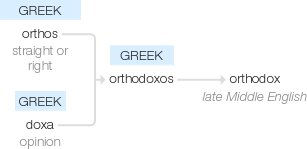Orthodox
late Middle English: from Greek orthodoxos (probably via ecclesiastical Latin), from orthos ‘straight or right’ + doxa ‘opinion’.
wiktionary
From Late Latin orthodoxus, from Ancient Greek ὀρθόδοξος(orthódoxos), from ὀρθός(orthós, “straight”) + δόξα(dóxa, “opinion”).
etymonline
orthodox (adj.)
mid-15c., in reference to theological opinions or faith, "what is regarded as true or correct," from Late Latin orthodoxus, from Greek orthodoxos "having the right opinion," from orthos "right, true, straight" (see ortho-) + doxa "opinion, praise" (from dokein "to seem;" from PIE root *dek- "to take, accept").
Of other subjects than religion or theology from 1640s. Meaning "of or pertaining to the Greek Church," by 1772. As a noun, "member of the Eastern Orthodox Church, from 1580s. In reference to a branch of Judaism, recorded from 1853; as a noun meaning "an Orthodox Jew," by 1889.
